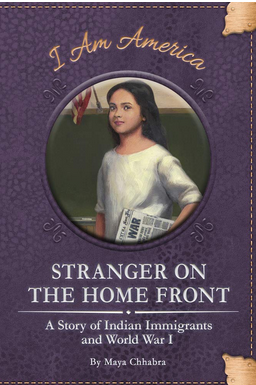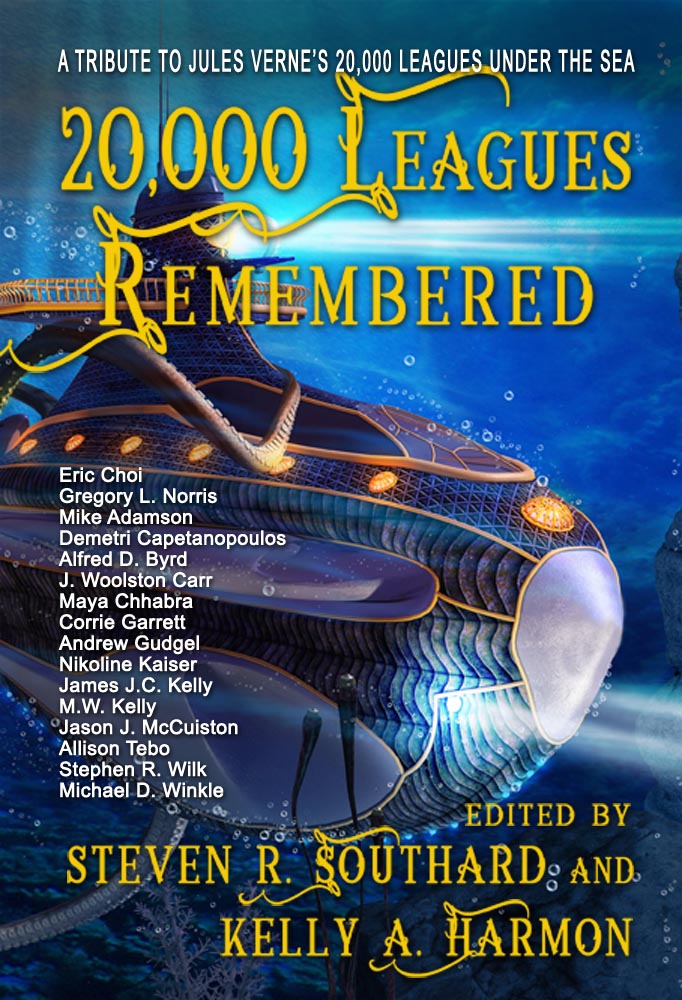Having just launched the new anthology 20,000 Leagues Remembered, I took the opportunity to interview one of the ‘crewmembers.’ Please welcome author Maya Chhabra aboard our literary Nautilus. Readers will enjoy her story, “The Maelstrom,” and will want to find out more about her and read her other works.
Maya Chhabra is the author of the middle grade historical novel Stranger on the Home Front (Jolly Fish Press), dealing with Indian immigration and the Indian independence movement. Her short fiction and poetry have appeared or are forthcoming in Daily Science Fiction, Cast of Wonders, and Strange Horizons. Visit her online at Maya Reads Books, or on Twitter as @mayachhabra.
Here’s the interview:
Poseidon’s Scribe: How did you get started writing? What prompted you?
Maya Chhabra: I don’t actually know! I’ve been writing since I was a little kid, probably because I liked books so much. I got started with poetry because my aunt is a poet, but I don’t know how I got started with prose.
P.S.: Who are some of your influences? What are a few of your favorite books?
M.C.: My influences for poetry include Sonya Taaffe, another author of mythological poetry. Prose influences depend on the project I’m working on. For example, for Stranger on the Home Front, I was influenced by Laurence Yep’s middle grade stories about growing up Chinese in different parts of US history, particularly his book The Traitor. I wanted to do a similar sort of story about early Punjabi immigrants. The cross-cultural friendship in The Traitor also influenced my portrayal of Margaret and her best friend Betty.
P.S.: You’ve had a great number of poems published. Do you find your skill as a poet complements your prose writing? Do you find yourself thinking in poetic imagery, rhythms, and word sounds before converting to prose?
M.C.: For me, they’re very different, because a poem is so compact and closed. It has to hit its theme very quickly and hard, rather than a novel where you have time to explore the theme. However, I do try to make my prose aesthetically pleasing and use metaphorical language.
P.S.: Many of your poems touch on classical or mythological references. Why is that?
M.C.: I grew up with D’Aulaire’s Book of Greek Myths and it made a big impression on me.
P.S.: Is there a common attribute that ties your fiction together (genre, character types, settings, themes) or are you a more eclectic author?
M.C.: I think I’m definitely pretty eclectic, but my favorite genres to work in are fantasy, historical, and SF. I don’t really write contemporary, not since I was a teenager just starting out. I like the setting of my work to be removed from everyday life.
P.S.: You’ve written a novel, Stranger on the Home Front, to be published in 2021. Please tell us a little about the book’s protagonist, Margaret Singh, and the conflicts she faces.
M.C.: Margaret is a mixed-race girl growing up in WWI-era San Francisco. Her father is an immigrant from India who’s involved with a radical pro-independence group based out of the US, and when the group goes on trial, he’s implicated, leading to difficulties for his family. This is based on the Hindu Conspiracy Trial, at the time the most expensive trial in US history, which exposed a link between the Central Powers and an Indian independence movement to sabotage the British Empire. Part of the conflict has to do with the perception of disloyalty, and that was influenced by my having been about Margaret’s age during the lead-up to the Iraq War. Reading about WWI, I saw many similarities in the “if you’re not with us, you’re against us” mindset. The friendship and conflict between German-American Betty, who wants nothing more than to prove her patriotism despite the suspicion others have of her heritage, and Margaret, whose radical family is out of step with the nationalistic mood of the country, is really the heart of the novel.
P.S.: Where do you get the ideas for your stories?
M.C.: Often I start with a pre-existing story, like a myth or fairy tale, or a bit of history. I like to show an angle on things that people might not have thought of before, even if they’re familiar with the history or story.
P.S.: Your story, “The Maelstrom” appears in 20,000 Leagues Remembered. Jules Verne would have called it a pourquoi, or origin, story. It tells a version of the backstory of Captain Nemo, (originally Prince Dakkar). How did you come up with the idea for this story?
M.C.: I love 20,000 Leagues Under the Sea, and I’d been fascinated by Prince Dakkar’s story since finding out about it from The Mysterious Island, especially because I basically grew up on the story of the Indian independence movement. Prince Dakkar is obviously fictional and belongs to a generation before the independence movement really took off—he’s royalty, whereas that movement was led by lawyers and other middle-class people. But his feelings toward colonialism as described by Jules Verne definitely resonated. I’d always wanted to explore his story and this anthology was the perfect opportunity. I also appreciated that Jules Verne, despite not really being ahead of his time on racial and ethnic issues, was able to portray the resentment towards imperialism with such feeling, to the point where the original English translator had to tone it down and make the narration more condescending to make it palatable to a British audience.
P.S.: “The Maelstrom” depicts Prince Dakkar’s wife as a strong and determined woman, a very admirable character. How do you see her as different from, or similar to, Margaret Singh of Stranger on the Home Front?
M.C.: Margaret is a shy girl who knows, as a mixed-race kid in a predominantly white environment, that she’s outnumbered and only conditionally accepted. She learns over the course of the story to stand up for herself, and also to realize that other people are also going through similar conflicts between social acceptance and integrity. The princess, Prince Dakkar’s wife, is far from being shy. She’s been raised in a life of privilege, but also stands out as unusual for a woman of her time. I thought she made a good partner for a strong personality like that of Captain Nemo, explaining his longstanding grief for her.
Poseidon’s Scribe: What advice can you offer aspiring writers, particularly things you wish you had known when starting out?
Maya Chhabra: I’d still consider myself an aspiring writer, as I’m trying to get an agent for my YA fantasy novel Thorns. But my advice would be: send stuff out. Don’t let rejection get you down, and even if it does, keep putting yourself out there. Don’t be shy about approaching editors for opportunities, but do your research first.
Thank you, Maya.
Readers can find out more about Maya at her website, on Twitter, on Facebook, and on Goodreads.
Poseidon’s Scribe



